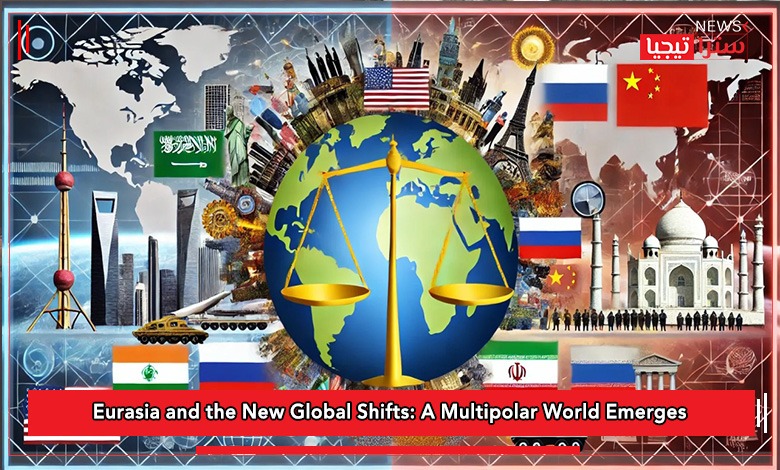Department of Strategic Security and Military Research and Studies 22-11-2024
In recent years, the concept of Eurasia has garnered renewed attention as the world undergoes profound geopolitical and civilizational shifts. Central to these discussions is Alexander Dugin, the Russian philosopher and political theorist whose vision of a multipolar world challenges the hegemony of the West. Dugin’s ideas, grounded in geopolitics, civilizational identity, and his “Fourth Political Theory”, offer a framework for understanding the changing dynamics of global power.
This article examines the emerging multipolar world through the lens of Eurasia, exploring Dugin’s influence on the contemporary global order. It focuses on the roles of key civilizations and regions, including the West, Russia, China, India, Africa, Latin America, and the Islamic world, in shaping the new geopolitical landscape.
The Decline of Western Hegemony
For decades, the global order has been dominated by Western civilization, led by the United States and its European allies. This unipolar world has been characterized by liberal democratic values and economic globalization, often enforced through military and economic coercion. However, cracks in this system have become increasingly apparent, driven by economic disparities, cultural polarization, and resistance from rising powers.
Dugin argues that the West’s leadership is not rooted in civilizational plurality but in the dominance of a single state, the United States, over others. This monolithic approach denies the cultural and political autonomy of non-Western civilizations. In the new multipolar order, the West will retain influence but must compete as one of several global poles.
Russia: The Eurasian Heartland
Eurasia lies at the heart of Dugin’s philosophy, with Russia positioned as its natural leader. Historically, Russia’s geopolitical space encompasses both Europe and Asia, creating a unique civilizational identity that blends elements of both. Dugin envisions Russia reclaiming its traditional influence by consolidating the Eurasian region as a cohesive geopolitical and cultural bloc.
Russia’s recent actions align with this vision. From its annexation of Crimea to its interventions in Syria and Africa, Moscow is asserting control over its “near abroad” while forging alliances that challenge Western dominance. This strategy underscores the importance of the Eurasian space as a strategic and cultural battleground in the emerging order.
China: The Geopolitical Powerhouse
China’s rise as an economic and political superpower is reshaping global dynamics. Its Belt and Road Initiative (BRI), which extends across Eurasia, Africa, and Latin America, underscores its ambitions for geopolitical dominance. Dugin sees China as a critical pole in the multipolar world, leveraging its economic strength and cultural heritage to influence global governance.
While China and Russia share common goals in countering Western hegemony, their partnership is pragmatic. China’s focus on economic expansion complements Russia’s emphasis on geopolitical consolidation, creating a strategic alignment that reinforces the multipolar vision.
India: The Emerging Power
India’s ascent as a global power adds complexity to the Eurasian equation. With its growing economy, technological advancements, and strategic location, India is carving out an independent sphere of influence. As a member of BRICS, India plays a pivotal role in countering Western dominance while maintaining a distinct identity.
Dugin acknowledges India’s potential as a rising power but emphasizes its integration into a broader multipolar framework. India’s civilizational depth and geopolitical ambitions make it a key player in shaping the new order, particularly in balancing China’s dominance in Asia.
Africa: A Civilizational Resurgence
Africa’s role in the multipolar world is often overlooked, yet it holds significant potential. Dugin identifies South Africa, Ethiopia, and Egypt as pivotal states representing Africa’s historical and civilizational depth. These nations, alongside others, are asserting their agency in global affairs, challenging Western neo-colonialism, and seeking partnerships that reflect mutual respect.
Russia and China’s increasing involvement in Africa, through investments and military alliances, underscores the continent’s strategic importance. The inclusion of Ethiopia and Egypt in BRICS signals a shift towards recognizing Africa as a vital player in the global order.
Latin America: A Rising Bloc
Latin America, led by Brazil and Argentina, is emerging as a cohesive force in the multipolar world. Brazil, as a founding member of BRICS, has long championed the interests of the Global South. Argentina’s recent inclusion in the bloc reflects the region’s growing alignment with Eurasian powers in challenging Western hegemony.
Latin America’s civilizational identity, rooted in a blend of indigenous and colonial histories, offers a unique perspective on global governance. Dugin views the region as an essential component of the multipolar order, contributing to the balance of power through its economic and cultural influence.
The Islamic World: A Strategic Ally
The Islamic world holds a unique position in the multipolar framework. Represented in BRICS by Saudi Arabia, the UAE, and Iran, the Islamic bloc bridges cultural and geopolitical divides. Dugin emphasizes the shared values between Russia and the Islamic world, particularly in resisting Western liberalism and upholding traditional values.
The inclusion of Sunni-majority states alongside Shia-majority Iran highlights the potential for unity within the Islamic world. This alliance, according to Dugin, can play a transformative role in countering Western influence and fostering a more equitable global order.
Conclusion: Toward a Just Multipolar World
The emergence of a multipolar world represents a fundamental shift in global power dynamics. Dugin’s vision, grounded in civilizational diversity and geopolitical balance, offers a compelling alternative to the unipolar order dominated by the West. By recognizing the unique identities and contributions of each pole, whether Russia, China, India, Africa, Latin America, or the Islamic world, the new order seeks to create a more just and balanced world.
As Eurasia reclaims its historical role as the center of global influence, the challenges and opportunities of this transformation will shape the future of international relations. In this new era, the world will not be defined by dominance but by collaboration among civilizations, each contributing to the tapestry of a shared humanity.

